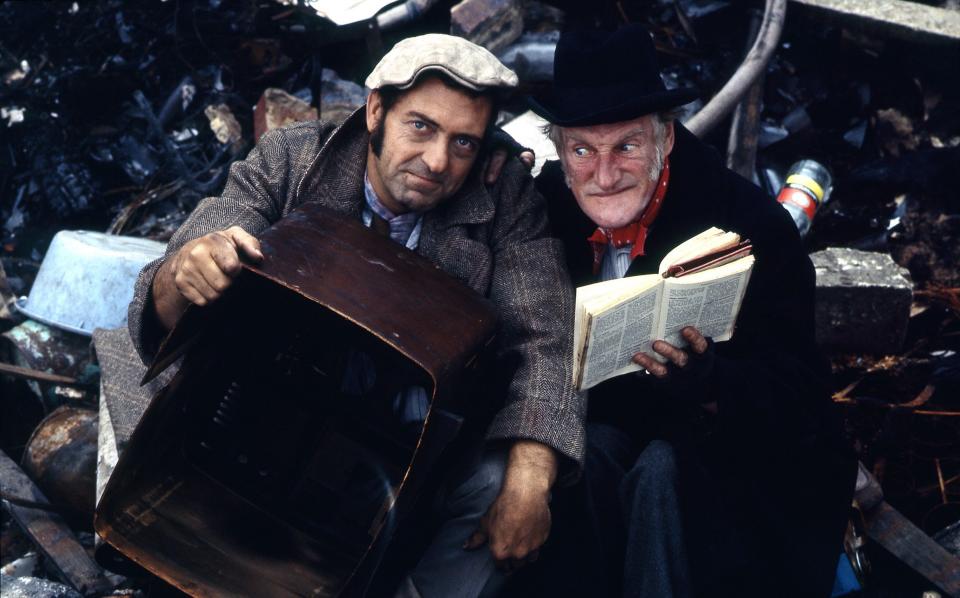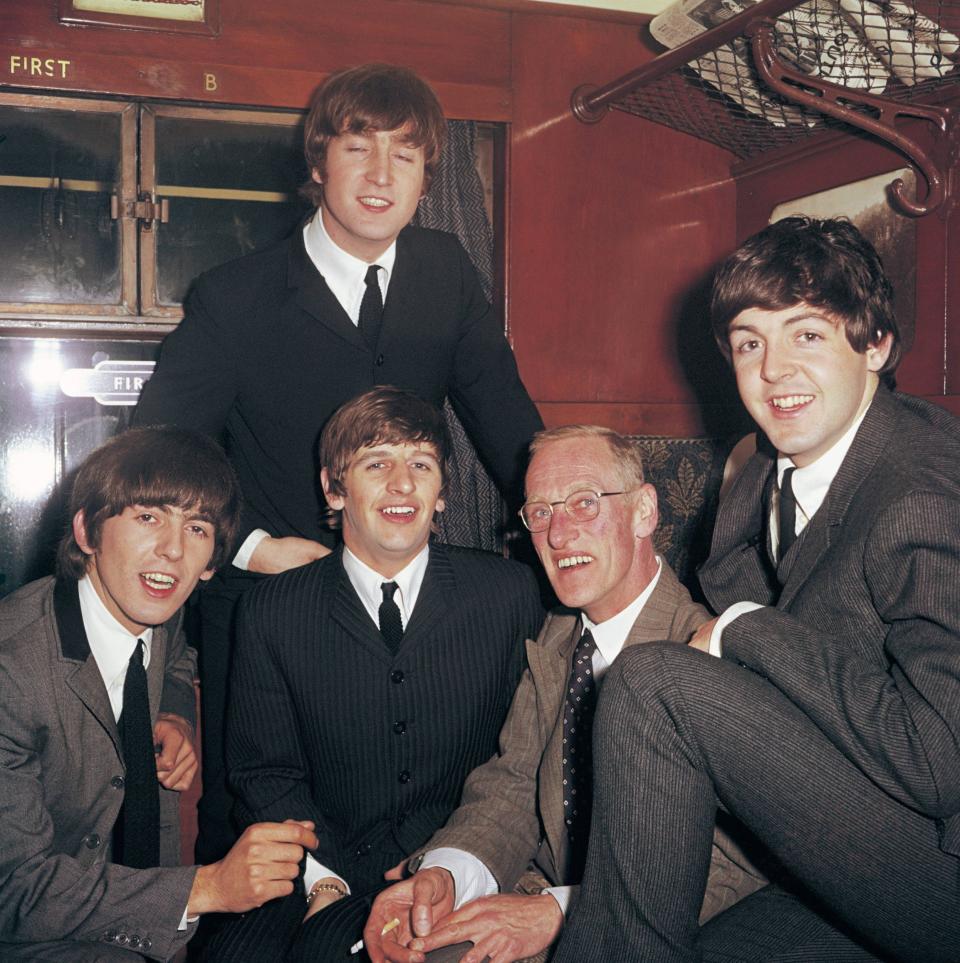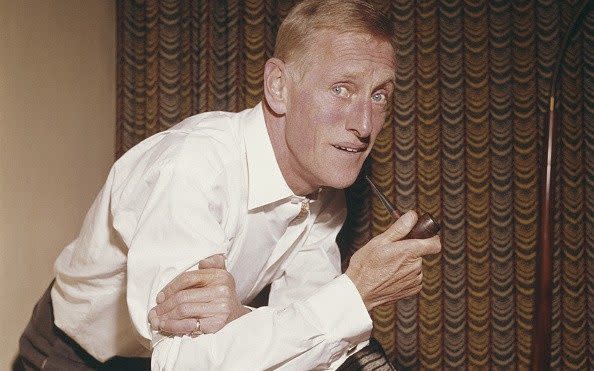Was Steptoe star Wilfrid Brambell really a ‘dirty old man’?

Some say The Human Centipede is the most disgusting thing ever screened; others the coprophagic banquet in Pasolini’s Salò. These opinions are incorrect. The worst was broadcast on BBC television on January 10 1963, and involved a naked rag and bone man, some tepid water and a jar of pickled onions.
It happened on an episode of Steptoe and Son. For the uninitiated, Ray Galton and Alan Simpson’s sit-com was set in a totter’s yard on Oil Drum Lane, Shepherd’s Bush, but described a relationship drawn from the Beckettian plane: Albert and Harold, father and son, trapped with each other for eternity; the young man desperate to escape into culture and light, the old one conniving to keep him stuck in a domestic wilderness of mildew and taxidermy. Harold was played by Harry H Corbett – tall, declarative, impassioned; Albert by Wilfrid Brambell – scrawny, desiccated, cynical.
In “The Bath”, Harold’s girlfriend is about to arrive for pre-bingo Manhattans. Unfortunately, his father is in the living room, flannelling himself in a tin bath. Panicked and ashamed, Harold begs him to hurry up and finish. Instead, Albert sends him to fetch the kettle of water on the gas ring. And this is where the horror begins.
It’s all in Brambell’s bony physicality. He reaches behind the bath and produces a plate of food. Absurdly, it’s under a cloche. He settles his dinner on the washboard next to a bottle of beer. Then he’s shaking ketchup on to his plate.
Finally, he produces a chip-shop-size jar of pickled onions. In a blur of elbows, he stabs at them with a fork. But he’s clumsy, and some of the onions spill into the bathwater.

He scoops them up and puts them back into the jar. As he rummages around his groin for rogue pickles, the camera cuts to Harry H Corbett, returned from the kitchen with four words that would pursue his co-star to the grave: “You dirty old man!” His delivery is freighted with the knowledge that some 20 million viewers are now imagining a vinegary bulb nudging at Old Steptoe’s soapy cheeks.
That line, inevitably, provides a title for Brambell’s first biographer. “You Dirty Old Man!” is a quick read. David Clayton’s book exhibits a congruence with the physique of its subject unmatched since The Man Who Was Private Widdle (2001), Roger Lewis’s slim study of the Carry On actor Charles Hawtrey. It’s also a peculiar and Pooterish work. Clayton quotes, in its entirety, a letter in which the actor Ian Ogilvy professes never to have met Brambell, but the author also dismisses interest in his subject’s sexual orientation as “pointless tittle-tattle”. And then there’s the question raised by the title. Wilfrid Brambell – dirty or clean? It’s the distinction on which a whole life seems to turn.
The audience watching Albert Steptoe in the bath would have brought their own ideas. Four weeks before the show was transmitted, Brambell had been all over the papers, thanks to an incident in the gents’ lavatories at Shepherd’s Bush Green. The magistrate handed down a guilty verdict for “importuning for an immoral purpose”. But this was not a breathless night on the tiles from the pages of Joe Orton. The actor seems to have done nothing more than stand at the urinals, smiling at the clientele – one of whom turned out to be Sergeant Vivian Allen of the Met.
Brambell was born in Dublin in 1912, the son of an amateur opera singer and a Guinness factory cashier. He was a fey boy with a sharp tongue. (“Akela, you’re a s---!” he told Miss Olive Goodbody, mistress of his Wolf Cub troop, when she failed him for his housemanship badge.) He trained at Yeats’s Abbey Theatre; played Sir Andrew Aguecheek at the Gate, Dublin, in 1942 and the Fool to Hugh Griffith’s Lear in an Arts Council tour of 1949.

The old man roles arrived long before he was old. At the age of 49, he was cast as John Mills’s dad in Flame in the Streets (1961), despite being four years his junior. Dirt, too, often attended him: in Clive Exton’s TV play No Fixed Abode (1959), he played a tramp whose toenails attract comment even in the doss house. In the dark stage comedy Stop It, Whoever You Are (1961), he was a factory lavatory attendant who receives sexual attention from a 14-year-old girl (appalled audience members shouted “filth” during some performances). After the pickled onion scene had turned Albert Steptoe’s dirtiness into a national catchphrase, the idea of hygiene seemed inescapable: when Richard Lester cast Brambell as Paul McCartney’s grandfather in A Hard Day’s Night (1964), his exceptional cleanliness is one of the film’s running gags.
Brambell himself clearly reacted to this. Before every Steptoe performance he let his stubble grow. After the recording he shaved in his dressing room, changed into a smart suit and was able to walk back into the street unrecognised. The photo libraries reveal him as a dandy of the Peter Wyngarde school: here he is, in a chocolate-brown psychedelic shirt and thin wool tie, fag held deftly between his fingers; there, with a Russian hat, knee-length A-line fur jacket, cravat, gloves and neat little manbag.
This fastidiousness extended to the management of his personal life. Between 1948 and 1955, Brambell was married to an Irish actress called Molly Hall. There was a child, probably fathered by their lodger. Nothing is known of the fate of Molly, her son or her lover. In the 1970s, Yussof Bin Mat Saman, a Malaysian man whom Brambell likely met on one of his many trips to Hong Kong, moved into his Pimlico flat, where he remained until after Brambell’s death. Brambell spoke of him as his “valet”. Nothing more is known of him.
Brambell clearly went east to enjoy sexual freedoms that were not available to him at home. One of the first stories I ever heard about him was from a journalist who interviewed him for the Swindon Advertiser, when his most urgent topic of conversation was not his touring production of Emlyn Williams’s The Late Christopher Bean, but a novelty wristwatch he had purchased in Hong Kong, with a dial depicting couples in different sexual positions.

Brambell’s compartmentalisation of his existence tells a story about gay and bisexual life in post-war Britain, its pleasures, risks and shames, its narratives of dirt and cleanliness. This, we should recall, is a country in which the radio personality Gilbert Harding once woke up naked and terrified in the North British Hotel in Edinburgh, his one-night stand having stolen his wallet, his clothes, and all the questions for that week’s Round Britain Quiz.
The 2008 TV biopic The Curse of Steptoe, which cast Phil Davis as Brambell and Jason Isaacs as Corbett, attempted to convey something of its atmosphere. But the film’s accuracy – not least its portrait of a wretchedly hostile relationship between its subjects – was so questioned that the BBC withdrew it and rewrote its guidelines on the depiction of real people on the screen. It chilled the BBC’s interests in such projects, which is regrettable. Imagine a series of biopics on the intertwined lives of post-war British comedy stars – Kenneth Williams, Charles Hawtrey, Barbara Windsor, Hattie Jacques, Tony Hancock, Corbett and Brambell. It would describe a world of passion and agony and defeat. It would be our Heimat.
After the pickled onions are back in the jar, Harold gives his father a lecture on cleanliness. “The bath is for washing in. You bath in the bath and you eat your dinner at the dinner table.” It’s a line that would have sat happily in one of the great anthropological works of the period, Mary Douglas’s Purity and Danger (1966), in which she offers her famous definition of dirt as “matter out of place”. “Food is not dirty in itself,” she writes, “but it is dirty to leave cooking utensils in the bedroom, or food bespattered on clothing; similarly, bathroom equipment in the drawing room.”
Brambell lived by such proprieties. A lover in Hong Kong was a valet in Pimlico. The dirty old man on screen was scrubbed and suited on the street. The details of his life? He washed them away, and now they’re gone, like bathwater.
You Dirty Old Man! by David Clayton (The History Press, £20) is out now

 money
money 